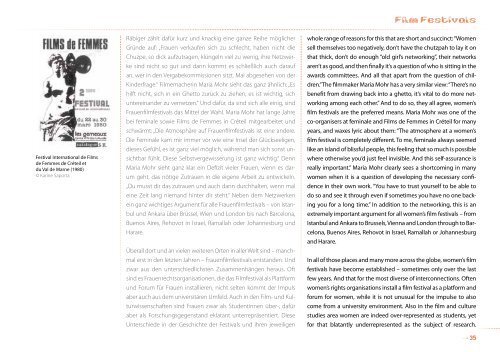short report - AG Kurzfilm
short report - AG Kurzfilm
short report - AG Kurzfilm
Erfolgreiche ePaper selbst erstellen
Machen Sie aus Ihren PDF Publikationen ein blätterbares Flipbook mit unserer einzigartigen Google optimierten e-Paper Software.
Festival International de Films<br />
de Femmes de créteil et<br />
du Val de Marne (1980)<br />
© Karine Saporta<br />
Räbiger zählt dafür kurz und knackig eine ganze Reihe möglicher<br />
Gründe auf: „Frauen verkaufen sich zu schlecht, haben nicht die<br />
Chuzpe, so dick aufzutragen, klüngeln viel zu wenig, ihre Netzwerke<br />
sind nicht so gut und dann kommt es schließlich auch darauf<br />
an, wer in den Vergabekommissionen sitzt. Mal abgesehen von der<br />
Kinderfrage.“ Filmemacherin Maria Mohr sieht das ganz ähnlich: „Es<br />
hilft nicht, sich in ein Ghetto zurück zu ziehen, es ist wichtig, sich<br />
untereinander zu vernetzen.“ Und dafür, da sind sich alle einig, sind<br />
Frauenfilmfestivals das Mittel der Wahl. Maria Mohr hat lange Jahre<br />
bei feminale sowie Films de Femmes in Créteil mitgearbeitet und<br />
schwärmt: „Die Atmosphäre auf Frauenfilmfestivals ist eine andere.<br />
Die Feminale kam mir immer vor wie eine Insel der Glückseeligen,<br />
dieses Gefühl, es ist ganz viel möglich, während man sich sonst unsichtbar<br />
fühlt. Diese Selbstvergewisserung ist ganz wichtig.“ Denn<br />
Maria Mohr sieht ganz klar ein Defizit vieler Frauen, wenn es darum<br />
geht, das nötige Zutrauen in die eigene Arbeit zu entwickeln.<br />
„Du musst dir das zutrauen und auch dann durchhalten, wenn mal<br />
eine Zeit lang niemand hinter dir steht.“ Neben dem Netzwerken<br />
ein ganz wichtiges Argument für alle Frauenfilmfestivals – von Istanbul<br />
und Ankara über Brüssel, Wien und London bis nach Barcelona,<br />
Buenos Aires, Rehovot in Israel, Ramallah oder Johannesburg und<br />
Harare.<br />
Überall dort und an vielen weiteren Orten in aller Welt sind – manchmal<br />
erst in den letzten Jahren – Frauenfilmfestivals entstanden. Und<br />
zwar aus den unterschiedlichsten Zusammenhängen heraus. Oft<br />
sind es Frauenrechtsorganisationen, die das Filmfestival als Plattform<br />
und Forum für Frauen installieren, nicht selten kommt der Impuls<br />
aber auch aus dem universitären Umfeld. Auch in den Film- und Kulturwissenschaften<br />
sind Frauen zwar als Studentinnen über-, dafür<br />
aber als Forschungsgegenstand eklatant unterrepräsentiert. Diese<br />
Unterschiede in der Geschichte der Festivals und ihren jeweiligen<br />
Film Festivals<br />
whole range of reasons for this that are <strong>short</strong> and succinct: “Women<br />
sell themselves too negatively, don’t have the chutzpah to lay it on<br />
that thick, don’t do enough “old girl’s networking”, their networks<br />
aren’t as good, and then finally it’s a question of who is sitting in the<br />
awards committees. And all that apart from the question of children.”<br />
The filmmaker Maria Mohr has a very similar view: “There’s no<br />
benefit from drawing back into a ghetto, it’s vital to do more networking<br />
among each other.” And to do so, they all agree, women’s<br />
film festivals are the preferred means. Maria Mohr was one of the<br />
co-organisers at feminale and Films de Femmes in créteil for many<br />
years, and waxes lyric about them: “The atmosphere at a women’s<br />
film festival is completely different. To me, feminale always seemed<br />
like an island of blissful people, this feeling that so much is possible<br />
where otherwise you’d just feel invisible. And this self-assurance is<br />
really important.” Maria Mohr clearly sees a <strong>short</strong>coming in many<br />
women when it is a question of developing the necessary confidence<br />
in their own work. “You have to trust yourself to be able to<br />
do so and see it through even if sometimes you have no one backing<br />
you for a long time.” In addition to the networking, this is an<br />
extremely important argument for all women’s film festivals – from<br />
Istanbul and Ankara to Brussels, Vienna and London through to Barcelona,<br />
Buenos Aires, Rehovot in Israel, Ramallah or Johannesburg<br />
and Harare.<br />
In all of those places and many more across the globe, women’s film<br />
festivals have become established – sometimes only over the last<br />
few years. And that for the most diverse of interconnections. Often<br />
women’s rights organisations install a film festival as a platform and<br />
forum for women, while it is not unusual for the impulse to also<br />
come from a university environment. Also in the film and culture<br />
studies area women are indeed over-represented as students, yet<br />
for that blatantly underrepresented as the subject of research.<br />
r 35













